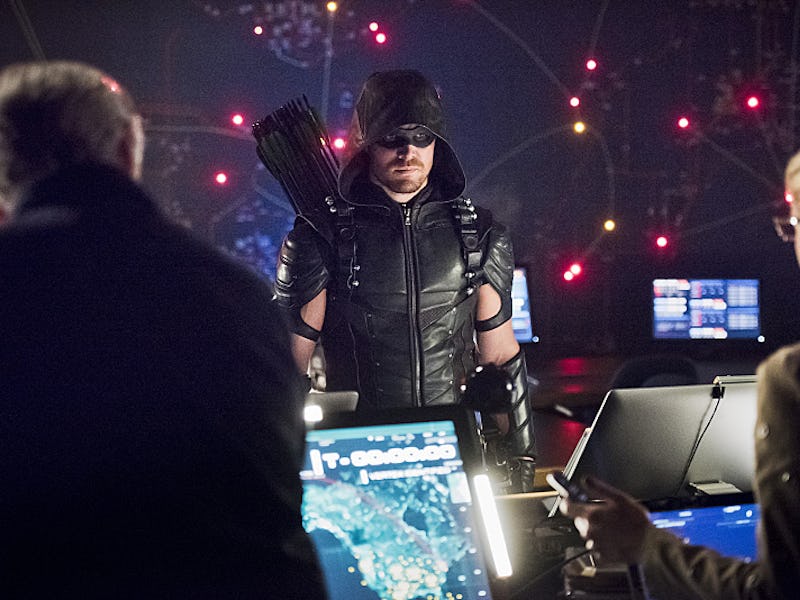'Arrow' Episode 'Monument Point' Is One of the Most Important in DC TV History
"Monument Point" will change everything, for better or worse.

Bomb plots! Whether it’s in Tom Clancy novels, action flicks, or comic books, you can always expect square-jawed heroes to cut the fuse and save the day from nuclear annihilation at the very last minute. Sure, bombs are a too-easy, too-familiar device that lazily raises the stakes, but immortals like Bond, Bourne, and Batman need them because nothing short of a boom can feel worthy against them. So Arrow made the DC superhero Green Arrow languishing in his fourth season outright fail.
“Monument Point,” for better or worse, will go down as one of the most important episodes ever in the sprawling DC TV universe, and it’s only a shame the episode itself couldn’t be worthy beyond its legitimately explosive ending.
After Oliver Queen (Stephen Amell) became magically bulletproof in the numbingly boring “Genesis”, this week’s “Monument Point” hit the ground running with Thea (Willa Holland) stuck in confinement with her father Malcolm (John Barrowman). Damien Darhk (Neal McDonough) is one step closer to unleashing his master plan, Genesis, so he sends Green Arrow’s previous bad guys, Brick (Vinnie Jones) and Murmur (Adrian Glynn McMorran) to get master hacker and father to Felicity (Emily Bett Rickards), the Calculator (Tom Amandes) to unleash the world’s nuclear weapons. They will be Darhk’s world destroying flood and his Wayward Pines bunker his Biblical ark. Calculator wants nothing to do with that, however, and so the Green Arrow and Felicity reluctantly team up with him to prevent armageddon.
Yeah, Arrow was very busy, and “Monument Point” is altogether flat despite the legitimately high stakes. Green Arrow fires more than one arrow this episode, but the episode is breathless and nothing feels like it properly lands. There’s more threads I’ve omitted mentioning, but the single most important is that Team Arrow, even with A.R.G.U.S., don’t win the day.
One nuke slips their grasp, and ten thousand perish in a fiery holocaust. It’s a minor comfort that Felicity deflected the nuke away from where it would claim millions, but that’s hard to make a case for alleviating one’s guilt. There’s no blood or portrayals of mass suffering; thankfully Zack Snyder didn’t direct this one. The director, Mortal Kombat: Legacy’s Kevin Tancharoen (who also directed The Flash and Marvel’s Agents of S.H.I.E.L.D. this season) and the Arrow writers wisely leave it to imagination. Nuclear armageddon is too big for TV, and it’s most effective when it’s left unseen.
Ten thousand is way more than double the casualties in the Marvel comic book arc that ignited the Superhero Registration Act. And it’s way, way, way more that set forth the events of Captain America: Civil War and the Sokovia Accords. Ten thousand is about the amount perished in Man of Steel (although in that movie it felt like the whole east coast).
Is the Arrowverse headed towards its own registration? Superheroes now run amok, as do superpowered meta-humans and magical sorcerers. A.R.G.U.S. doesn’t have much sway in the federal government — a single line from Lilah (Audrey Marie Anderson) implies the organization is lower on the pole, under the Department of Defense — but ten thousand dead may propel A.R.G.U.S. forward as the public turns against superheroes. Or at least it should. While Supergirl will be left unaffected, Flash and Arrow certainly will and should be, as will the Legends of Tomorrow when they return from their time-travel vacation.
Arrow is the centerpiece of the Arrowverse, and the finale is happening very soon and Oliver needs to fight Damien Darhk. But with ten thousand gone, the general public in the Arroweverse should say something. There are more superheroes than ever, and they should outcry for accountability. Not because I’m Team Tony Stark, but because I just want the Arrowverse to feel more alive.